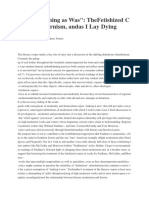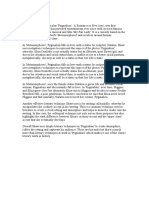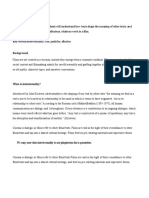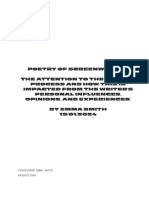The Shining Guide
The Shining Guide
Uploaded by
Rozan SubhiCopyright:
Available Formats
The Shining Guide
The Shining Guide
Uploaded by
Rozan SubhiCopyright
Available Formats
Share this document
Did you find this document useful?
Is this content inappropriate?
Copyright:
Available Formats
The Shining Guide
The Shining Guide
Uploaded by
Rozan SubhiCopyright:
Available Formats
THE SHINING
about the book IN brief:
Danny Torrance is only five years old, but in the words of old Mr. Hallorann, he shines with an exceptional psychic talent. For most of Dannys life, his clairvoyant abilities have helped him to puzzle out his parents troubled relationship, but when his father accepts a position as the winter caretaker for the Overlook Hotel high in the Rocky Mountains, the little boys visions spiral into the realm of nightmare. As blizzards isolate the Torrances, the hotel seems to develop a sinister life of its own. At night, unseen revelers ride the elevators and even the animal-shaped hedges of the topiary prowl the hotels grounds like threatening predators. But when Danny meets the woman in room 217, he discovers that the hotels phantom guests are more than shadows. Like Danny, the Overlook shines, but the energy it emanates is deadly.
IN detail:
Jack Torrance is a gifted young writer, but his alcoholism and his temper have almost ruined his life. When his three-year-old son Danny spilled a beer all over one of his manuscripts, Jack spun the little boy around to spank him and accidentally broke his arm. Although this incident filled him with self-loathing and almost destroyed his marriage, it was not until Jack and his drinking buddy Al Shockley thought that theyd hit a child while driving home from a late-night drinking session that Jack decided it was time to get sober. But unfortunately for Jack, even without alcohol to inflame it, his temper continued to get the better of him. While teaching English at a Vermont prep school, Jack struck a disgruntled student he caught slashing his tyres; a mistake which cost him his job. Jack interviews for a position as the winter caretaker for the Overlook Hotel, an exclusive but isolated resort located high in the Rocky Mountains. Jack desperately needs the work to support his family, but just as importantly he craves five to six months of seclusion so that he can finish his current play. Although the hotel manager is uncertain about hiring a family man for the job (a previous winter caretaker slaughtered his wife and children during a murderous bout of cabin fever), Jack gets the position. But Jacks little boy Danny is less than enthusiastic about his familys move to the Overlook Hotel. Although he is only five, Danny is a powerful telepath and already senses that the Overlook is a bad place. Danny does not openly share his fears with his parents, but begins to have more and more psychic trances which frighten them badly. At the Overlook, Dannys worries are eased by the hotels fatherly cook, Dick Hallorann. Like Danny, Hallorann has the shine - a pronounced psychic ability - and assures Danny that the Overlooks many ghosts are like pictures in a book and they cant harm him. But though Hallorann speaks bravely to Danny, hes less than certain that its wise for such a powerfully psychic boy to spend the winter in the evil old hotel. As winter closes in, and as blizzards and snowdrifts trap the Torrance family in the Overlook, the hotel works its sinister magic in subtle and horrible ways. Determined to absorb Danny into itself so that it can use his psychic powers, the Overlook begins to prey upon Jack Torrances mind, and it is not above manipulating Jacks personal demons to get what it wants. As Jack begins to change and as the spirits of the Overlook take
on a terrifying physicality, Danny and his mother become more and more frightened. In the end, it is only Dannys shine that stands between the Torrances and the evil that wants to consume them all.
quotes:
Obviously a masterpiece, probably the best supernatural novel in a hundred years Peter Straub Stephen King is one of Americas finest writers Scotsman Not since Dickens has a writer had so many readers by the throat . . . Kings imagination is vast. He knows how to engage the deepest sympathies of his readers . . . one of the great storytellers of our time Guardian Superb craftsmanship . . . this hotel is far more sinister than Hill House . . . the reader is in the grip of real fright, not wanting to go on yet unable to stop. You must know what comes next at any cost! Science Fiction Review
author biography:
Stephen King was born in Portland, Maine, in 1947 and won a scholarship to attend the University of Maine at Orono. While working at the university library he met Tabitha Spruce, who was also an aspiring writer. The two of them married in 1971, the year after Stephen King graduated from college. Although during the first months of his marriage Stephen King worked as a labourer at an industrial laundry (supplementing his income by selling occasional short stories to mens magazines), by autumn he had taken up a teaching position at Hampden Academy. King continued to write on weekends and during the evening, but his teaching responsibilities seriously cut into his creative time. He also began to drink; as he describes in his guide On Writing, he didnt realize until much later that he was kind of writing about himself in The Shining. King got his big break in 1973, when Doubleday and Co.(US) accepted the novel Carrie. In 1974, King and his family moved to Boulder Colorado where he wrote The Shining. In the Autumn of that year, Stephen King and his wife had spent one night at the Stanley Hotel in Estes Park, Colorado. Since the hotel was due to close down the following day, the Kings were the only guests. As they wandered through the deserted corridors and ate a meal in the deserted dining room, King thought that the grand hotel would be the perfect setting for a ghost story. That night,hehad a nightmare which unified all of the fragments that hed been trying to puzzle together. In his nightmare, his three-year-old son was running though the hotels corridors, chased by a fire-hose. Waking with a start, King lit a cigarette and stared out the window at the imposing Rocky Mountains. The Shining was born.
starting points for discussion:
1. In what ways does The Shining manoeuvre between the supernatural tale and the psychological drama? How does this combination help to make the story so terrifying? 2. Stephen King has said that The Shining was one of the easiest novels hed ever written, but that it was also one of the most emotionally charged. Part of this was because King funneled so many of his own early fears into the doomed central character, Jack Torrance. How does he make Jack empathetic despite his many shortcomings? 3. One of the most powerful themes within The Shining is that of familial bonding and familial pain. In particular, King focuses on the difficult relationships between parents and children, and of love that can continue despite alcoholism and abuse. How does this love, and this abuse, add to the poignancy and also the horror of The Shining? 4. Jack and Al share a terrible secret they both fear that they killed a child one evening while driving home from a drunken escapade. What effect does that secret have on the reader? How does it propel the narrative?
5. According to traditional belief, babies born with cauls covering their faces are blessed (or cursed) with psychic powers. In other words, they are able to see beyond the veil that separates the world of the living from the world of the dead. Why do you think King decided to have Danny born with a caul? 6. One of the first signs of Jacks dangerous freefall into madness is that he begins to obsessively wipe his mouth. In fact, it almost becomes a nervous tick. What is the unconscious significance of this action for Jack, both symbolically and historically? 7. King believes that it is important to take a childs viewpoint seriously. Hence, children and adolescents are often the emotional focuses of his books. How does this work in The Shining? How does Dannys viewpoint, so carefully explained, affect the way we interpret the story? 8. Why do you think Dannys psychic ability takes the form of an imaginary playmate, and why do you think that the Overlook tries to block Dannys access to his invisible friend Tony? 9. The term The Shining makes us think of lamps and of lights in dark places. Why do you think this is so? What role does this image of light amid darkness play in the book?
10. Why do you think King wanted to echo John Lennons song Instant Karma in the title of this book? What role has Lennon played in our cultural imagination? 11. In fairytales, images of mothers and fathers are often split into multiple characters, some good and some bad. What father figures (both actual and symbolic) do we find in The Shining? 12. When Jack first discovers the wasps nest in the Overlooks roof, he interprets it both as a symbol of all that hes been through and as a good omen for the future. (After all, he was only stung once.) What fatal mistake does Jack make when he interprets his find? What do you think is the real symbolic significance of the wasps nest? 13. Although Danny is attacked by the woman in room 217, and although Jack Torrance also has a run-in with the specter, when questioned by his wife Jack maintains that room 217 is empty and that Danny must have harmed himself. Why do you think he says this? 14. Stephen King has stated that there is no horror without love and feeling . . ., because horror is the contrasting emotion to our understanding of all the things that are good and normal. Without a concept of normality, there is no horror. What do you think he means?
read extract:
Danny was standing outside room 217 again. The passkey was in his pocket. He was staring at the door with a kind of drugged avidity, and his upper body seemed to twitch and jiggle beneath his flannel shirt. He was humming softly and tunelessly. He hadnt wanted to come here. He was scared that he had taken the pass-key again, disobeying his father. He had wanted to come here. Curiosity (killed the cat; satisfaction brought him back) Was like a constant fishhook in his brain, a kind of nagging siren song that would not be appeased. And hadnt Mr Hallorannn said, I dont think theres anything here that can hurt you? (You promised.) (Promises were made to be broken.) He jumped at that. It was as if that thought had come from outside, insectile, buzzing, softly cajoling. Promises were made to be broken my dear redrum, to be broken. Splintered. Shattered. Hammered apart. FORE!) His nervous humming broke into low, atonal song. Lou, Lou, skip to mLou, skip
to mLou my daarlin . . . Hadnt Mr Hallorannn been right? Hadnt that been, in the end, the reason why he had kept silent and allowed the snow to close them in? Just close your eyes and it will be gone. What he had seen in the Presidential Sweet had gone away. And the snake had only been a fire hose that had fallen onto the rug. Yes, even the blood in the Presidential Sweet had been harmless, something old, something that had happened long before he was born or even thought of, something that was done with. Like a movie that only he could see. There was nothing, really nothing, in this hotel that could hurt him, and if he had to prove that to himself by going into this room, shouldnt he do so? Lou, Lou, skip to mLou . . . (Curiosity killed the cat my dear redrum, redrum my dear, satisfaction brought him back safe and sound, from toes to crown; from head to ground he was safe and sound. He knew that those things) (are like scary pictures, they cant hurt you, but oh my god) (what big teeth you have grandma and is that a wolf in a BLUEBEARD suit or a BLUEBEARD in a wolf suit and Im so) (glad you asked because curiosity killed that cat and it was the HOPE of satisfaction that brought him) up the hall, treading softly over the blue and twisting jungle carpet. He had stopped by the fire extinguisher, had put the brass nozzle back in the frame, and then had poked it repeatedly with his finger, heart thumping, whispering: Come on and hurt me. Come on and hurt me, you cheap prick. Cant do it, can you? Huh? Youre nothing but a cheap fire hose. Cant do nothing but lie there. Come on, come on! He had felt insane with bravado. And nothing had happened. It was only a hose after all, only canvas and brass, you could hack it to pieces and it would never complain, never twist and jerk and bleed green slime all over the blue carpet, because it was only a hose, not a nose and not a rose, not glass buttons or satin bow, not a snake in a sleepy doze . . . and he had hurried on, had hurried on because he was (late, Im late, said the white rabbit.) the white rabbit. Yes. Now there was a white rabbit out by the playground, once it had been green but now it was white, as if something had shocked it repeatedly on the snowy, windy nights and turned it old . . . Danny took the passkey from his pocket and slid it into the lock.
If you like THE SHINING , youll like:
Bag of Bones Salems Lot The Dead Zone 1408 from Everythings Eventual
other books by stephen king:
FICTION: Carrie The Shining Night Shift
The Stand Firestarter Cujo Different Seasons Cycle of the Werewolf Christine The Talisman (with Peter Straub) Pet Sematary It Skeleton Crew The Eyes of the Dragon Misery The Tommyknockers The Dark Half Four Past Midnight Needful Things Geralds Game Dolores Claiborne Nightmares and Dreamscapes Insomnia Rose Madder Desperation The Girl Who Loved Tom Gordon Hearts in Atlantis Dreamcatcher From a Buick 8 Cell Liseys Story Duma Key The Dark Tower I: The Gunslinger The Dark Tower II: The Drawing of the Three The Dark Tower III: The Waste Lands The Dark Tower IV: Wizard and Glass The Dark Tower V: Wolves of the Calla The Dark Tower VI: Song of Susannah The Dark Tower VII: The Dark Tower By Stephen King as Richard Bachman Thinner The Running Man The Bachman Books The Regulators Blaze NON-FICTION: Danse Macabre On Writing (A Memoir of the Craft)
website links:
www.stephenking.co.uk www.stephenking.com
You might also like
- Deck of Illusions PDFDocument14 pagesDeck of Illusions PDFSteveNo ratings yet
- The Signalman by Charles DickensDocument6 pagesThe Signalman by Charles Dickenskaramhussain4434No ratings yet
- Blowin' in The Wind AnalysisDocument1 pageBlowin' in The Wind AnalysisRuthwik BhupatirajuNo ratings yet
- A. Dvorak Rusalka" - Song To The Moon: Literal TranslationDocument2 pagesA. Dvorak Rusalka" - Song To The Moon: Literal TranslationSandra SiniväliNo ratings yet
- Biography of Sir Lewis CarrollDocument4 pagesBiography of Sir Lewis CarrollSohel BangiNo ratings yet
- CineAction 055Document76 pagesCineAction 055Andy MyersNo ratings yet
- Analysis of Some Graphic NovelsDocument4 pagesAnalysis of Some Graphic Novelspaulxu94No ratings yet
- The Buterfly Lion QuestionsDocument16 pagesThe Buterfly Lion QuestionsTrino Grau50% (2)
- The Scarlet Letter PDFDocument49 pagesThe Scarlet Letter PDFRaul Zenith100% (5)
- The Shining Book ReportDocument2 pagesThe Shining Book Reportnochu nochuNo ratings yet
- Book Review: Slaughterhouse FiveDocument2 pagesBook Review: Slaughterhouse FiveDeveri JohnsonNo ratings yet
- ALICE EssayDocument11 pagesALICE Essaylopezortizlaura100% (1)
- Ap Literature Research PaperDocument8 pagesAp Literature Research Paperapi-547780303No ratings yet
- Fahrenheit 451Document3 pagesFahrenheit 451api-355437549No ratings yet
- Araby HandoutDocument2 pagesAraby HandoutTaibur RahamanNo ratings yet
- Contemporary Children'S Literature Graphic Novel: Kursus Orientasi DSKP Tahun 6 KSSR 2015Document35 pagesContemporary Children'S Literature Graphic Novel: Kursus Orientasi DSKP Tahun 6 KSSR 2015George HiiNo ratings yet
- IronyDocument1 pageIronyDas EducationNo ratings yet
- J. R. R. Tolkien: Rings Trilogy. The Works Have Had A Devoted International Fan Base and Been AdaptedDocument2 pagesJ. R. R. Tolkien: Rings Trilogy. The Works Have Had A Devoted International Fan Base and Been AdaptedguachupinaNo ratings yet
- Travels With Sally Potter's OrlandoDocument18 pagesTravels With Sally Potter's OrlandoushiyerNo ratings yet
- The Element of Uncanny in FrankensteinDocument7 pagesThe Element of Uncanny in FrankensteinAniket100% (1)
- As I Lay Dying%Document21 pagesAs I Lay Dying%fadwaNo ratings yet
- Donald E. Morse - The Fantastic in World Literature and the Arts_ Selected Essays From the Fifth International Conference on the Fantastic in the Arts (Contributions to the Study of Science Fiction AnDocument200 pagesDonald E. Morse - The Fantastic in World Literature and the Arts_ Selected Essays From the Fifth International Conference on the Fantastic in the Arts (Contributions to the Study of Science Fiction AnOlaru FlorentinaNo ratings yet
- Optional Course Syllabus (Proiect de Programă Pentru Opţional)Document13 pagesOptional Course Syllabus (Proiect de Programă Pentru Opţional)apgalan100% (1)
- Visual Language in MausDocument47 pagesVisual Language in MausBubble CakeNo ratings yet
- Comics, Multimodality, and Multiliteracy: How Graphic Novels Fit Into The Changing Literary WorldDocument7 pagesComics, Multimodality, and Multiliteracy: How Graphic Novels Fit Into The Changing Literary WorldrainbowneontikiNo ratings yet
- Ben Lander - Graphic Novels As HistoryDocument14 pagesBen Lander - Graphic Novels As HistorykimdealNo ratings yet
- GlorianaDocument422 pagesGlorianaSantosh KaushikNo ratings yet
- History of NovelDocument13 pagesHistory of NovelJoharah SevillaNo ratings yet
- Roald Dahl Popular, Prolific, ControversialDocument3 pagesRoald Dahl Popular, Prolific, Controversialseratoll28491100% (1)
- ENG 2140 Notes - Literature and FilmDocument10 pagesENG 2140 Notes - Literature and FilmD Maborosi ShignobuNo ratings yet
- Minights Children - ThemesDocument4 pagesMinights Children - ThemesLilianaNo ratings yet
- ART HISTORY Frey - BaetensDocument30 pagesART HISTORY Frey - Baetensludovico.stellaNo ratings yet
- RecitatifDocument3 pagesRecitatifmichaelmatiNo ratings yet
- Literary Analysis George Bernard Shaw's Literary Technique in PygmalionDocument1 pageLiterary Analysis George Bernard Shaw's Literary Technique in PygmalionMery_7No ratings yet
- Course Concepts HandoutDocument4 pagesCourse Concepts Handoutapi-520766585No ratings yet
- Chronology Moon PalaceDocument6 pagesChronology Moon PalaceSullyNo ratings yet
- Towards Defining Postrealism in British LiteratureDocument32 pagesTowards Defining Postrealism in British LiteratureCristian Rizo RuizNo ratings yet
- The Rise and Reason of Comics and Graphic Literature Critical Essays On The Form Edited by Joyce Goggin and Dan Hassler ForestDocument5 pagesThe Rise and Reason of Comics and Graphic Literature Critical Essays On The Form Edited by Joyce Goggin and Dan Hassler ForestOanaNo ratings yet
- Chehov's Magic Lake: A Reading of The SeagullDocument7 pagesChehov's Magic Lake: A Reading of The SeagullEmily KarakokkinouNo ratings yet
- 3 From Modernism To PostmodernismDocument26 pages3 From Modernism To PostmodernismCosmina Catina MihailaNo ratings yet
- The Picture of Dorian Gray and The Temple of The Golden PavilionDocument16 pagesThe Picture of Dorian Gray and The Temple of The Golden PavilionFarrel MaxNo ratings yet
- Graphic Texts: SampleDocument10 pagesGraphic Texts: SamplersowmyasriNo ratings yet
- 21st Century LiteratureDocument4 pages21st Century LiteratureAbsNo ratings yet
- Wt2 How and Why Social Groups Are Represented in A Particular WayDocument2 pagesWt2 How and Why Social Groups Are Represented in A Particular Way장서아100% (1)
- Cae TypesDocument250 pagesCae Typesdiepanh08No ratings yet
- Sula Lesson PlansDocument20 pagesSula Lesson Planstatertot100% (3)
- The Hobbit: A Quest For IdentityDocument6 pagesThe Hobbit: A Quest For IdentityBenNo ratings yet
- Charles Dickens IntroductionDocument11 pagesCharles Dickens IntroductionJoana BuchlerNo ratings yet
- College Recommended ReadingDocument3 pagesCollege Recommended ReadingalexNo ratings yet
- William Petersen - A General Typology of MigrationDocument12 pagesWilliam Petersen - A General Typology of MigrationMichel Felipe Moraes MesaliraNo ratings yet
- Study Guide to Of Mice and Men and Other Works by John SteinbeckFrom EverandStudy Guide to Of Mice and Men and Other Works by John SteinbeckNo ratings yet
- Intertextuality and FilmsDocument7 pagesIntertextuality and FilmsMd Intaj AliNo ratings yet
- The Painted Door PPPDocument17 pagesThe Painted Door PPPapi-263138429No ratings yet
- Image, Text, and Story - Comics and Graphic PDFDocument8 pagesImage, Text, and Story - Comics and Graphic PDFErlan BelloLimaNo ratings yet
- "Of Maus and Men Postwar Identity Through A Postmodern Lens in Art Spiegelman's Maus" by Eric SteingoldDocument5 pages"Of Maus and Men Postwar Identity Through A Postmodern Lens in Art Spiegelman's Maus" by Eric SteingoldAnonymous JShpvpSNo ratings yet
- More Critical Approachesto ComicsDocument305 pagesMore Critical Approachesto Comicsdoraszujo1994No ratings yet
- Contextualize The Text From A Historical and Cultural Point of View - FFFF BunDocument1 pageContextualize The Text From A Historical and Cultural Point of View - FFFF BunIonela Iordan100% (1)
- Slaughterhouse-Five Sample EssayDocument5 pagesSlaughterhouse-Five Sample EssayVedant RoyNo ratings yet
- Maus Book ReviewDocument5 pagesMaus Book ReviewSohomChatterjeeNo ratings yet
- Comics Start HereDocument12 pagesComics Start HerePatricia MastricoloNo ratings yet
- Frankenstein PPT by VidushiDocument11 pagesFrankenstein PPT by VidushiVidushi Pal100% (1)
- Study Guide to The Major Plays of George Bernard ShawFrom EverandStudy Guide to The Major Plays of George Bernard ShawNo ratings yet
- An Incomprehensible Condition: An Unauthorised Guide to Grant Morrison's Seven Soldiers: Guides to Comics, TV, and SFFrom EverandAn Incomprehensible Condition: An Unauthorised Guide to Grant Morrison's Seven Soldiers: Guides to Comics, TV, and SFNo ratings yet
- ExcerptDocument13 pagesExcerptJamille Pinheiro DiasNo ratings yet
- Reading Comprehension Pre TestDocument9 pagesReading Comprehension Pre TestFajar KurniasihNo ratings yet
- Poetry of Screenwriting Emma SmithDocument7 pagesPoetry of Screenwriting Emma Smithapi-644385149No ratings yet
- Informal LetterDocument2 pagesInformal LetterAldea SimonaNo ratings yet
- Writing Exams: What Do Examiners Want?: in The FieldDocument3 pagesWriting Exams: What Do Examiners Want?: in The FieldialhasanNo ratings yet
- Kolorowa Karta PostaciDocument1 pageKolorowa Karta PostaciMikołaj HincaNo ratings yet
- Sherwood Anderson ThesisDocument7 pagesSherwood Anderson Thesisafkolhpbr100% (2)
- Quiz 5Document1 pageQuiz 5jhomalynNo ratings yet
- c1 Prefix and SuffixDocument2 pagesc1 Prefix and SuffixMichele GranaNo ratings yet
- Sabrina The Teenage Witch Season 1 Episode 1 Conversation Topics Dialogs Information Gap Activi 77605Document5 pagesSabrina The Teenage Witch Season 1 Episode 1 Conversation Topics Dialogs Information Gap Activi 77605Florencia Cal ValenzuelaNo ratings yet
- Prose and Poetry - Definition and SamplesDocument9 pagesProse and Poetry - Definition and Samplesjulie anne mae mendozaNo ratings yet
- Irregular Simple Past and Past Participle Verb FormsDocument4 pagesIrregular Simple Past and Past Participle Verb FormsAlvaro Owen0% (1)
- Book ReviewDocument4 pagesBook ReviewIekzkad RealvillaNo ratings yet
- PW Select January 2012Document28 pagesPW Select January 2012Publishers WeeklyNo ratings yet
- Harry Potter and The Sorcerer's Stone (2001)Document3 pagesHarry Potter and The Sorcerer's Stone (2001)Regis PravindNo ratings yet
- Lista de Verbos IrregularesDocument4 pagesLista de Verbos Irregularesmarcellusgiovannip7260No ratings yet
- Wuthering Heights AnalysisDocument15 pagesWuthering Heights AnalysisResh JagessarNo ratings yet
- TreasuresDocument1 pageTreasuresbrommkivNo ratings yet
- Puteri Gunung Ledang in Popular Media Womanhood, Femininity and Gender in Puteri Gunung Ledang (2004) and Magika (2010)Document24 pagesPuteri Gunung Ledang in Popular Media Womanhood, Femininity and Gender in Puteri Gunung Ledang (2004) and Magika (2010)Siti Hajar YusriNo ratings yet
- Improv Exercises06Document3 pagesImprov Exercises06lukleoNo ratings yet
- Calendar 4cDocument3 pagesCalendar 4capi-279529806No ratings yet
- Darnton, CensorshipDocument22 pagesDarnton, CensorshipJeremyCohanNo ratings yet
- Maureen McCarthy - Stay With Me (Extract)Document37 pagesMaureen McCarthy - Stay With Me (Extract)Allen & UnwinNo ratings yet
- Frithiof's SagaDocument362 pagesFrithiof's Sagajohn100% (1)
- Firefly Shiny Dice RulesDocument12 pagesFirefly Shiny Dice RulesNachoAndrésLlorente100% (1)
- 1 QSSWDocument14 pages1 QSSWpracadamosNo ratings yet

























































































